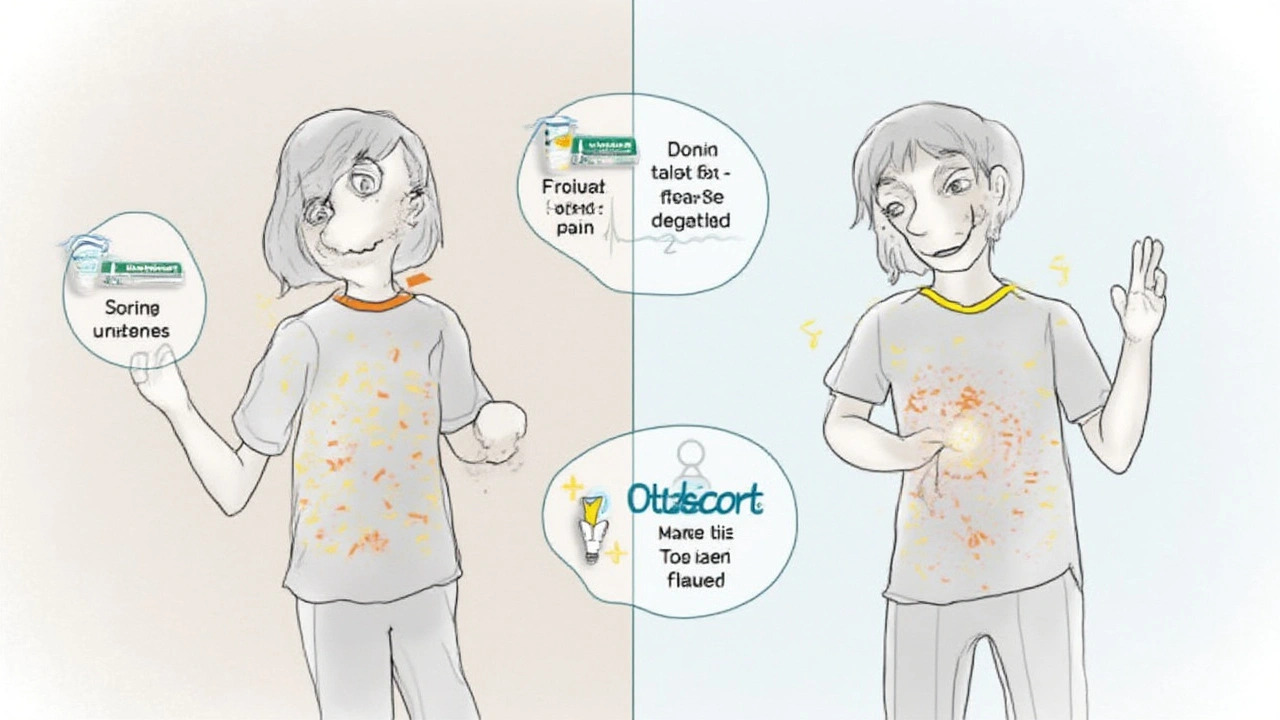Imagine living with a stomach that feels like it’s at war with itself most days—sharp cramps, bathroom emergencies, fatigue. People dealing with Crohn’s disease or ulcerative colitis don’t have to imagine. For them, it’s everyday life. Enter Entocort, a little-known, but powerful tool for calming these fires in the gut. It’s easy to think all steroids are alike or that complicated gut diseases only have one or two treatment options. In truth, steroids are a diverse bunch, and Entocort, in particular, stands out because of its targeted effect and fewer systemic side effects compared to its steroid cousins. Imagine a medicine designed to go straight to the problem area without causing a storm of side effects elsewhere—that’s the magic Entocort tries to pull off.
What Exactly is Entocort?
Entocort is the brand name of budesonide, a corticosteroid designed to tackle inflammation right at its source—the bowels. While budesonide comes in multiple forms, Entocort capsules are especially formulated to release the medication in the ileum and ascending colon. Those parts of the gut often take the brunt of Crohn’s. Typical oral steroids, like prednisolone, are famous for tackling inflammation but come with a lot of baggage in the side-effects department: weight gain, moon face, trouble sleeping, acne, even mood swings. Entocort attempts to avoid most of that by sitting tight and working locally inside the gut, then getting broken down quickly by the liver. Because of this clever design, a study published in "The Lancet" in 2017 found that patients on Entocort experienced fewer classic steroid complications than those on prednisolone—think less insomnia, less bloating, and way fewer “hangry” moments. That’s surely a relief for anyone who’s ever seen themselves balloon up after a few weeks of classic steroids.
Budesonide was first synthesized back in the 1970s, but its use in inflammatory bowel disease really picked up steam in the early 2000s when targeted-delivery formulations like Entocort entered the market. Doctors quickly noticed that patients were having an easier time sticking to their treatment. Imagine that—no more dreading the side effects nearly as much as the disease itself. With Entocort’s time-released action—usually over a 3 to 6 mg daily dose—the gut gets constant anti-inflammatory attention while the rest of the body is left in peace. That’s a major win for quality of life.
How Entocort Works: A Peek Under the Lid
So how does this capsule manage to be a superhero in the world of inflammation? Budesonide is a synthetic steroid that mimics the natural hormones your adrenal glands make when the body’s under stress. Instead of going on a body-wide rampage, it focuses on immune cells in the lining of the gut, calming them down when they get too rowdy. When taken as recommended, Entocort gets all the way to the ileum and colon before the capsule dissolves, releasing its good stuff right where inflammation needs to be squashed.
What’s really interesting is that Entocort is designed to avoid getting into the bloodstream in large amounts. After it does its job in the gut, the drug is mostly inactivated during its first trip through the liver—this is what scientists call “first-pass metabolism.” According to data presented at the European Crohn’s and Colitis Organisation in 2019, budesonide’s systemic bioavailability is less than 15%, while prednisolone is closer to 80%. This means Entocort is far less likely to cause whole-body effects, so most people don’t see the facial puffiness or major sleep problems associated with older steroids.
For people with Crohn’s affecting mainly the end of the small bowel and the beginning of the large one, Entocort is about as close to a sniper as steroids get. Typical regimens involve 3 mg capsules, once or up to three times a day, often for up to 8 weeks, followed by a slow taper over several more. Tapering is super important; stopping cold turkey can send the body into a tailspin, and symptoms can snap back with a vengeance. Some doctors use Entocort both as a "rescue" for bad flares and as a temporary maintenance tool when other medications are being introduced.

Who Should Consider Entocort: The Ideal Candidate
Now, not every stomach ache needs Entocort’s muscle. It’s meant for adults and children over eight with mild to moderate Crohn’s disease that targets the ileum and/or ascending colon. Some doctors also prescribe it for microscopic colitis—a rare but stubborn cause of chronic diarrhoea—or even after surgery to keep Crohn's in check. For people with severe, fast-spreading disease, or those with Crohn’s further along the colon or outside the intestine entirely, Entocort won’t do the trick. It relies on reaching the inflammation by mouth, so if gut absorption isn’t happening or parts of the bowel are missing, it might not work well.
Entocort isn’t perfect, but its lower risk of steroid side effects makes it especially valuable for patients who can’t tolerate traditional corticosteroids. Anyone with diabetes, osteoporosis, high blood pressure, history of infections, or really any long-standing health condition should always chat with their doctor before starting a steroid—Entocort included. And don’t forget allergies: it’s rare, but some folks can react to one of the capsule ingredients. Always check the ingredients list—UK pharmacies have the latest details posted online or in the patient leaflet. For pregnant or breastfeeding women, the studies are thin, so the risk/benefit has to be weighed up carefully.
People often try dietary changes, supplements, or biologic therapies before or alongside Entocort. But when a flare knocks you off your feet and nothing else works, Entocort can help you get your life back faster than waiting for long-term medications (like azathioprine or infliximab) to kick in. Since Entocort does not cure Crohn’s, it’s best thought of as the fire truck that puts out the blaze so rebuilding can safely begin.
Practical Tips: How to Take Entocort Without Losing Your Mind
No one wants medication to become another daily headache. Good news: taking Entocort is pretty straightforward. Swallow the capsules whole, with water, at the same time each day. Don’t crush, chew, or break them—this messes up the time-release effect, meaning the medicine could hit the wrong spot in your gut. If you miss a dose, aim to take it as soon as you remember, but skip it if it’s nearly time for your next scheduled dose—doubling up isn’t a good idea.
It’s also important not to mix up Entocort capsules and foam enema forms, which are designed for totally different situations. Always keep your prescription packaging and check it before you pop a pill. Store Entocort away from direct sunlight, not in a steamy bathroom, but somewhere cool and dry. Kids and pets? Keep it well out of their reach, the way you would any medication.
Some side effects might show up early, but they’re usually mild: think headache or nausea. Your doctor will probably order regular blood pressure checks and sometimes bone density scans, especially if you’re on steroids a lot. Rare but more serious side effects include mood swings, muscle weakness, and infections. If you feel unusually tired, develop bruising, or notice swelling that doesn’t quit, call your GP. Here’s a quick side effects table, with data from UK NHS resources:
| Side Effect | How Common? | What to Do |
|---|---|---|
| Headache | Common (1 in 10) | Usually settles, talk to your doctor if it persists |
| Nausea | Common (1 in 10) | Take with food, inform your GP if severe |
| Mood changes | Less common (1 in 50) | Report any major swings, especially low mood |
| Facial swelling | Rare (1 in 100) | Seek urgent advice |
| Easy bruising | Rare (1 in 100) | Let your GP know |
Wear a medic-alert bracelet if you’re on steroids long-term. It helps emergency responders know your situation fast. If you’re set for surgery, dental work, or vaccinations, make sure to mention that you’re taking Entocort, since steroids can throw your immune system’s response out of whack. Speaking of immune response: steer clear of live vaccines (like oral polio or yellow fever) until at least three months after you’ve finished. Regular flu and COVID jabs? Those are fine—just check in first. When it comes to food and drink, Entocort doesn’t have a forbidden food list, but heavy alcohol use isn’t a great idea. Alcohol and steroids can both stress your liver. Be honest with your medical team about your social habits.

Lifestyle, Monitoring, and Long-Term Thinking with Entocort
It’s tempting to believe that once symptoms calm down, you’re in the clear. But Crohn’s and colitis don’t play fair. The smart play is to keep tabs on your condition and stay in touch with your gastro team. Stick to any blood test schedule your doctor sets up—these check for effects on white blood cells, sugar levels, electrolytes, and how your liver’s coping. If you see unexpected weight gain or feel up one day and down the next, jot these in a diary or on your phone. Recognising patterns helps you spot a flare before it gets out of control.
Entocort is meant for the short haul. British Society of Gastroenterology guidelines advise against it as a permanent fix, because long-term steroids—even kinder ones like budesonide—increase risks for thinning bones, diabetes, and infections. Once things settle down, your doctor may move you to a "maintenance" plan with immunosuppressants or biologics, which are better-suited for the marathon, not just the sprint. If you need repeated Entocort courses in a year, or if symptoms don’t settle, it’s probably time to kick the treatment plan up a notch.
Practical tip: always schedule your medication reviews for before holidays or big life events. Troubleshooting in advance gives peace of mind. If you’re heading abroard and have to pack medication, keep it in hand luggage and bring your prescription and a doctor’s note—the last thing you want is to hit a customs snag when you need your capsules. Some UK airports even let you register your medication in advance for disability support. If you’re into sports, check with your club or coach about anti-doping rules too: Entocort is allowed, but sometimes needs a doctor’s declaration.
Lastly, talk. Don’t keep medication stress a secret. Crohn’s and colitis have a massive effect on mental health. Look for local support groups, especially if you live up north like me. Yorkshire boasts some brilliant patient-led meetups, from pub chats in Leeds to yoga days in York. If things go wobbly, you’re never as alone as you think.
Entocort’s not a miracle, but it’s a tool that’s helped loads of people get back into rhythms they love—school, work, hobbies—after gut trouble had them on the sidelines. Stay informed, be honest about what’s working, and partner with your health team. Crohn’s isn’t a solo sport, and neither is navigating medications like Entocort.




Charity Peters, July 14, 2025
Entocort saved my life. No more bathroom emergencies during work. Just take it like the doc says.
raja gopal, July 15, 2025
I’ve been on this for 6 months now after my flare-up in Delhi. The fatigue didn’t vanish overnight, but the cramps? Gone. I’m walking again, even to the temple. Thank you for writing this so clearly - it’s the kind of info I wish my doctor had handed me like this.
Samantha Stonebraker, July 15, 2025
There’s something deeply poetic about a drug that doesn’t want to be everywhere - just where it’s needed. Entocort feels like the quiet friend who shows up with tea and silence, not a lecture. It doesn’t try to fix your whole life, just the part that’s screaming. And sometimes, that’s all you need. I’ve seen people chase miracle cures while ignoring the gentle ones that actually listen. This is one of those.
Sarah Khan, July 16, 2025
The pharmacokinetics of budesonide are fascinating - first-pass metabolism as a feature, not a bug. The liver isn’t just a filter here, it’s a gatekeeper. Prednisolone floods the system like a sledgehammer; budesonide is a scalpel with a timer. The 15% systemic bioavailability isn’t a flaw, it’s a design triumph. We’ve spent decades treating inflammation like a global war when we needed targeted counterinsurgency. Entocort represents a paradigm shift in steroid delivery, not just a new pill. It’s not about reducing side effects - it’s about redefining what systemic means. The body isn’t a monolith, and medicine shouldn’t treat it like one.
Kelly Library Nook, July 18, 2025
While the article presents Entocort as a breakthrough, it omits critical data on long-term adrenal suppression. A 2021 meta-analysis in Gut showed 22% of patients on chronic budesonide developed HPA axis dysfunction after 12 months - comparable to prednisone in some cohorts. The claim of ‘fewer side effects’ is misleading without context. Additionally, the Lancet study cited had a 14% dropout rate due to adverse events. This is not a benign drug. It is a controlled-release glucocorticoid with a narrower therapeutic window than advertised. Patients deserve full disclosure, not marketing.
Faye Woesthuis, July 20, 2025
If you’re still on steroids in 2024, you’re doing it wrong. Biologics exist. Stop being lazy.
Kevin Mustelier, July 20, 2025
Entocort? Sounds like a brand name made by a guy who thought ‘cort’ was cool. 😒 I’ve been on 3 different meds. This one? Meh. Still got the moon face. Also, why is everyone in the US acting like this is some new miracle? We had this in the UK in 2005. 🤷♂️
Keith Avery, July 22, 2025
Let’s be real - this is just a repackaged glucocorticoid with a fancy capsule. The ‘targeted delivery’ is a gimmick. The liver still metabolizes 85% of it. That’s not magic, that’s basic pharmacology. And the ‘fewer side effects’ claim? Please. All steroids are steroids. You think your colon is somehow special? It’s not. You’re just getting a more expensive version of the same thing. The real breakthrough would be not needing steroids at all.
Crystal Markowski, July 23, 2025
For anyone considering Entocort, please remember: this isn’t a cure, it’s a bridge. I was on it for 8 weeks after my diagnosis - it gave me back enough stability to start working with my GI team on biologics. It didn’t fix me, but it gave me space to breathe while the real long-term plan took shape. Don’t rush to stop it. Don’t cling to it. Use it as the tool it is - temporary, targeted, and tough. And please, if you’re feeling weird emotionally, tell someone. Steroids mess with your head more than people admit. You’re not weak for needing help.
Kelly Yanke Deltener, July 24, 2025
So now we’re supposed to be grateful because a drug doesn’t make us look like a balloon? I’d rather have the moon face than spend my life being told I’m not sick enough to deserve real treatment. This is just corporate medicine pretending to care while keeping us on the leash. Entocort isn’t freedom - it’s a polite prison.
Luke Webster, July 26, 2025
Coming from India, I’ve seen how stigma around IBD makes people suffer in silence. This post doesn’t just explain a drug - it gives people language to talk about their pain. That’s powerful. I’ve shared this with my cousin in Mumbai who’s terrified to tell her family she needs steroids. Maybe this helps her feel less alone. That’s worth more than any study.
Samantha Stonebraker, July 27, 2025
That’s the thing no one says out loud - the real side effect of IBD isn’t the cramps or the fatigue. It’s the loneliness. We spend so much time managing our guts, we forget to manage our hearts. Entocort might quiet the inflammation, but it’s the people who say ‘I get it’ that quiet the silence. Thank you, raja gopal, for reminding us we’re not just patients. We’re people who still want to walk to the temple, or to the park, or just to the fridge without shame.